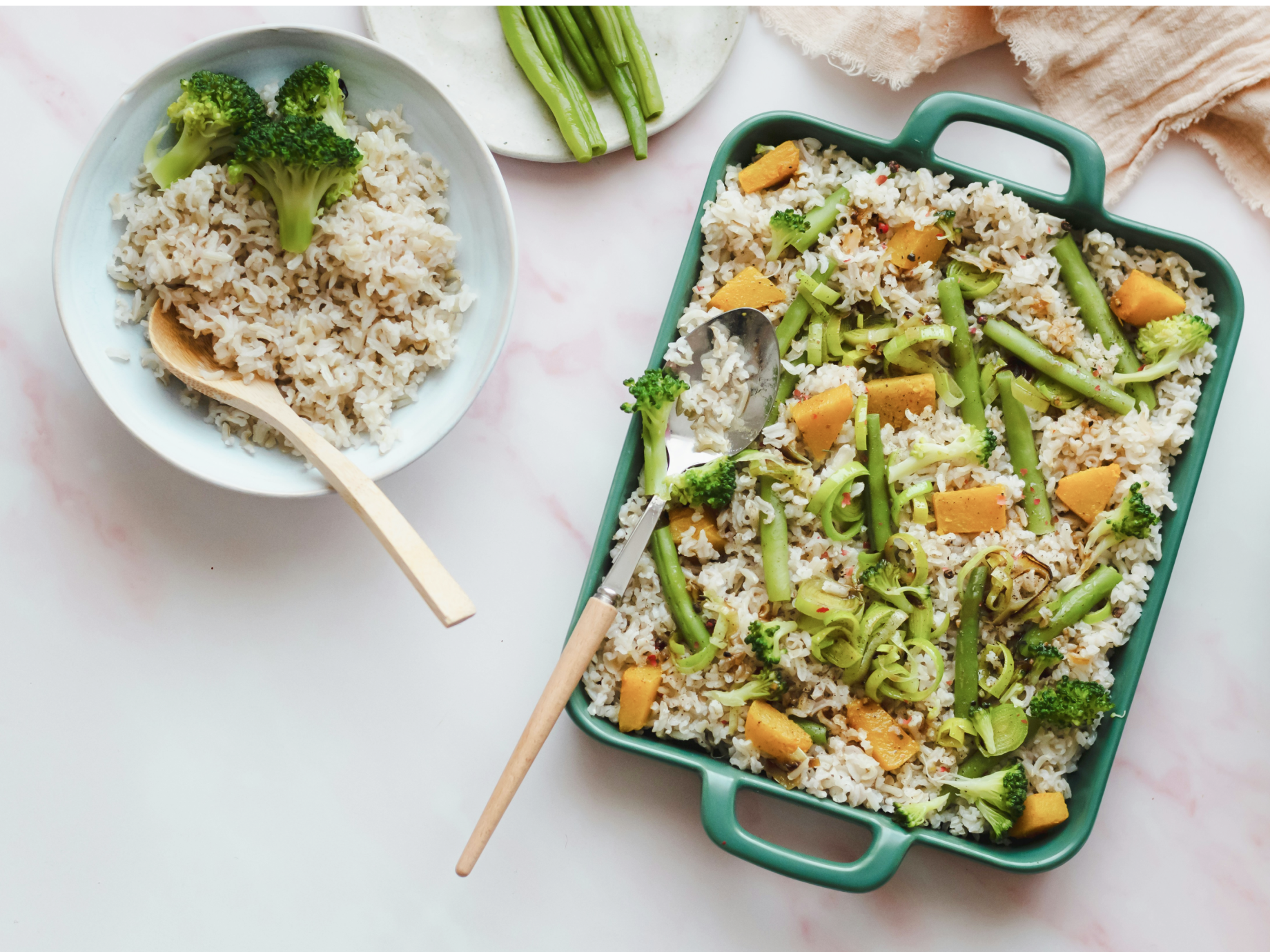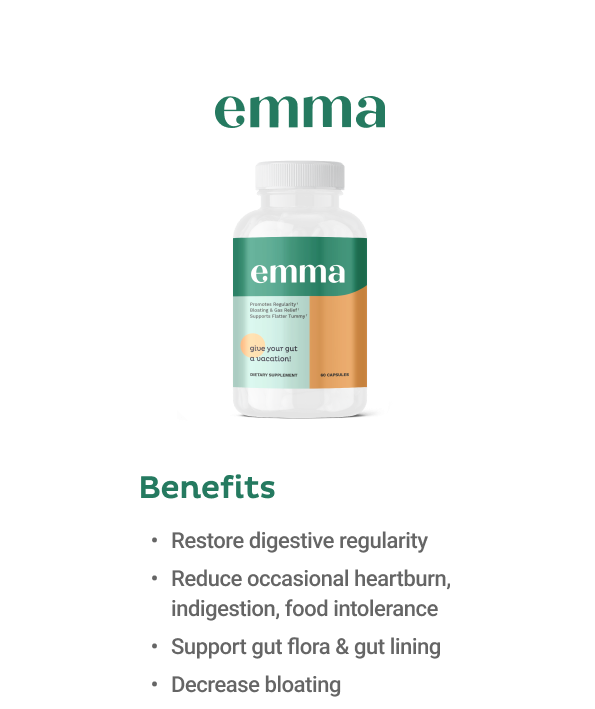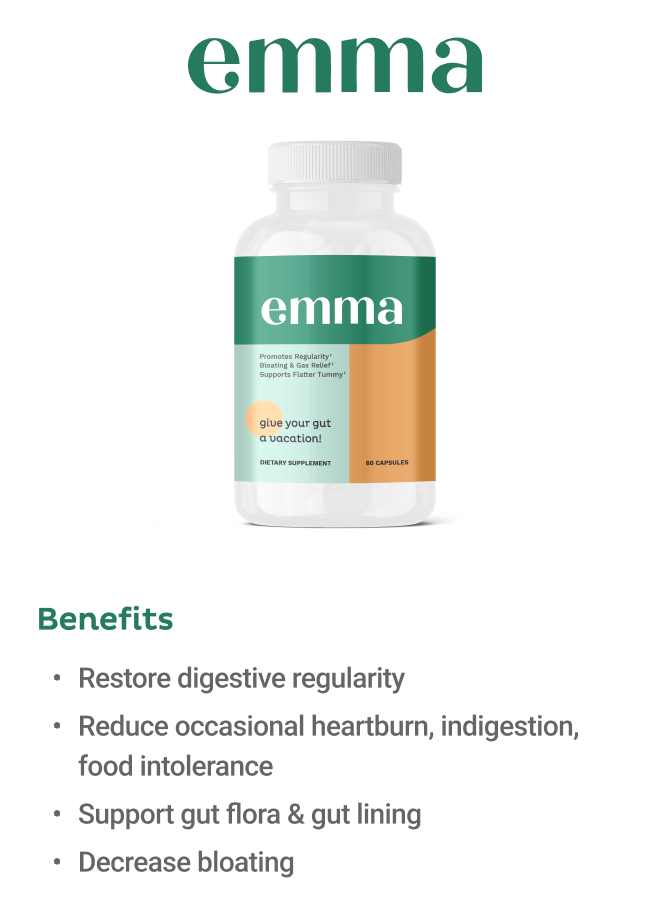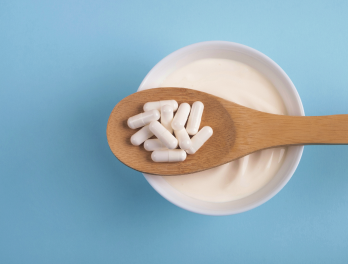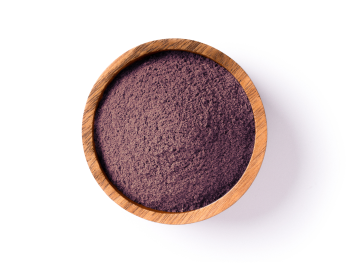We understand that digestive issues can be more than just uncomfortable — they can disrupt your entire
day.
Whether it's bloating, gas, or something more chronic like IBS or GERD, the struggle is real.
But here's some good news: improving your gut health might be as simple as tweaking what's on
your plate.
This guide will dive into 19 top foods known to aid digestion naturally. From fiber-rich staples that
regulate your system to anti-inflammatory choices that soothe, we've got your back — and your belly.
Let's explore how simple dietary changes can make a big difference.
Fiber-Rich Foods for Improved Digestion
Although the human body technically can’t digest it, fiber remains a vital component of the ideal
daily diet. Fiber helps the body regulate its use of sugars, controlling hunger and keeping blood
sugar levels in check.
Doctors and nutritionists recommend a minimum of 25 to 35 grams of
daily fiber intake,
but many don’t get this much from their meals and snacks. If you feel you’re in the same boat and you
want to increase your fiber consumption, consider the following fiber-rich foods to help improve your
digestion.
1. Whole Grains

Grains are a staple in most people’s diets worldwide. However, switching from processed grains to
whole grains can help improve your digestion. Whole grains include all of the kernel (bran, germ, and
endosperm).
Try whole grains like quinoa, brown rice, oats, and whole wheat bread.
2. Dark Green Vegetables

Vegetables are fantastic sources of insoluble fiber, which can help bulk up your stool and speed up
its passage through your digestive tract. Dark green vegetables like broccoli, spinach, Brussels
sprouts, and other leafy greens can keep you regular. They may also help feed the good bacteria in
your gut.
3. Papaya
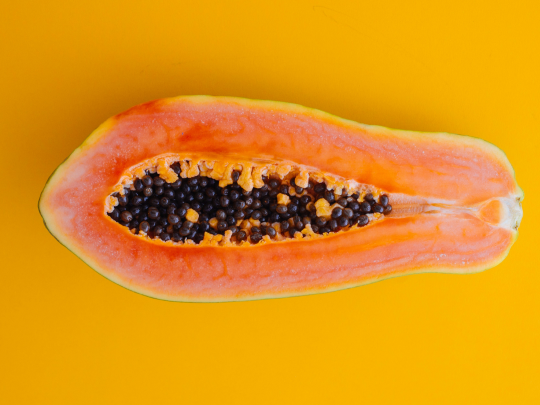
Papaya is a tropical fruit containing digestive enzymes like papain and chymopapain, which help break
down protein. IBS sufferers in particular may find some relief from bloating and constipation by
increasing their intake of papaya.
4. Beets
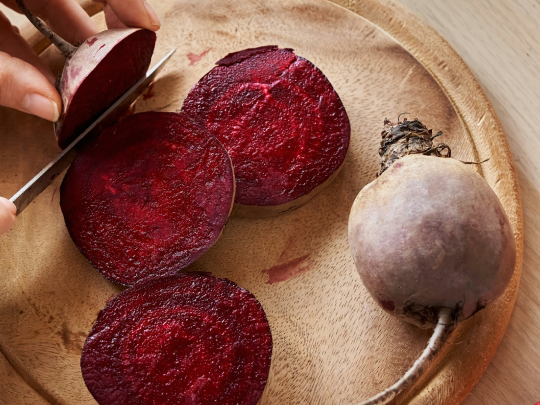
Beets or beetroot offer a generous amount of fiber along with various nutrients that can help feed
your good gut bacteria, promoting their growth. Adding beets to your smoothies and salads can help
increase your daily fiber intake.
5. Chia Seeds
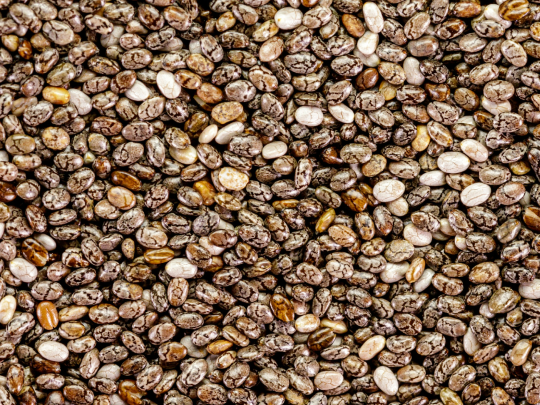
Chia seeds aren’t just rich in fiber. They also help support and promote the growth of good bacteria
in your gut. They also contain Omega-3, which may help reduce gut inflammation.
Remember that you must never consume
chia seeds
dry, as they may expand and cause blockages in your throat or stomach once they begin absorbing
liquid. Consume chia seeds that are pre-soaked in liquid or added to moist food like yogurt or oats.
6. Fennel
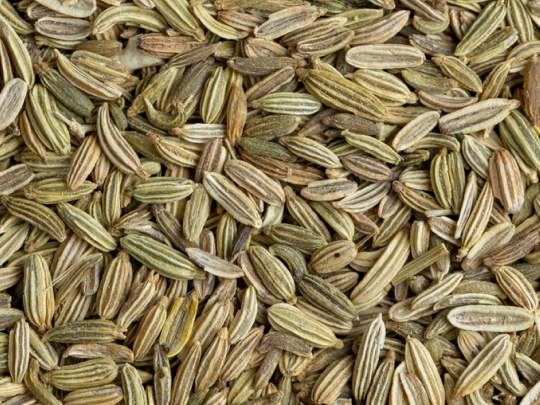
Fennel has a high fiber content and an anti-spasmodic agent that helps relax the muscles within your
digestive tract. Consuming fennel may help reduce cramping, bloating, and flatulence.
Anti-Inflammatory Foods for
Digestive Comfort
In simple terms,
inflammation
is one of the ways the body responds to a problem. It’s a process that helps the body fight injuries
and infections. Unfortunately, too much inflammation can keep the body stressed and on constant high
alert, impacting overall health.
There are many risks and conditions associated with chronic inflammation, including heart disease,
asthma, and cancer. Anti-inflammatory foods like the ones below help reduce both acute and chronic
inflammation — especially if the lifestyle changes are long-term.
7. Apples

Apples contain a soluble fiber called pectin, which can help resolve issues like constipation and
diarrhea. It may also reduce inflammation in the colon.
8. Certain Fish

Fish like salmon, mackerel, tuna, and sardines are excellent sources of healthy fats, such as omega-3
fatty acids. These healthy fats may help reduce gut inflammation.
9. Kefir
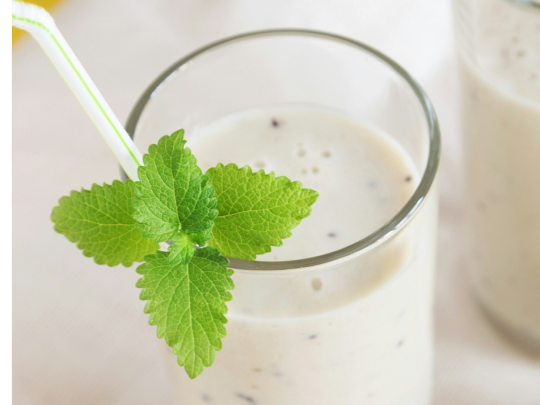
Kefir, a cultured dairy product, is made when kefir “grains” are added to milk. Much like yogurt,
kefir also contains good bacteria that can improve your digestion. Kefir may also help decrease gut
inflammation over time.
10. Certain Nuts
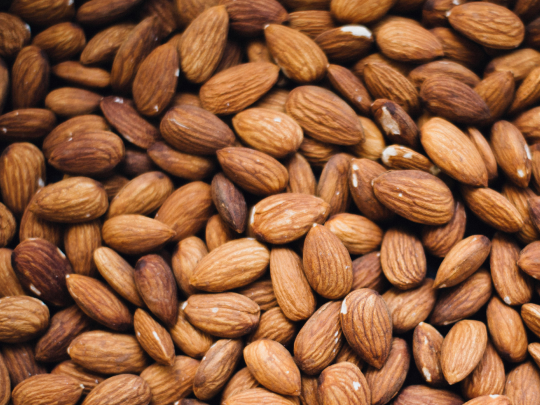
Some nuts, such as almonds and walnuts, are rich in antioxidants, vitamins, and minerals. Regular
consumption may help to reduce inflammation in the body and lower the risk of heart disease. It may
also help lower the LDL (bad) cholesterol levels in your blood.
Food Rich in Probiotics
Probiotics
are good yeasts and live bacteria that can help your body maintain a healthy gut flora, boosting
overall health and immunity. You can supplement your body’s natural population of good bacteria
through different means, including by eating probiotic-rich foods like the ones below.
11. Yogurt
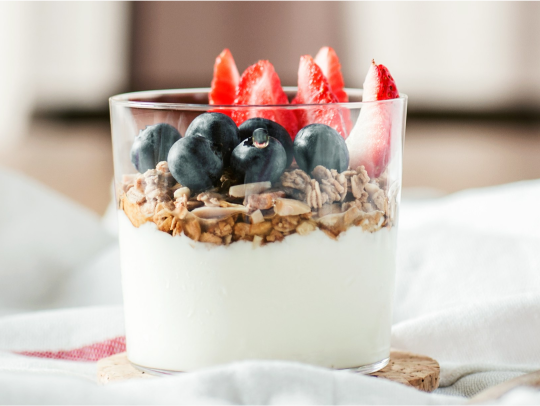
Aside from vitamins and minerals, most yogurts contain probiotics. Substituting ice cream and sweet
desserts with yogurt can help boost your probiotic intake, along with calcium, vitamin B12, and more.
When purchasing yogurt, select products that contain “live cultures” to ensure they contain
probiotics.
12. Tempeh
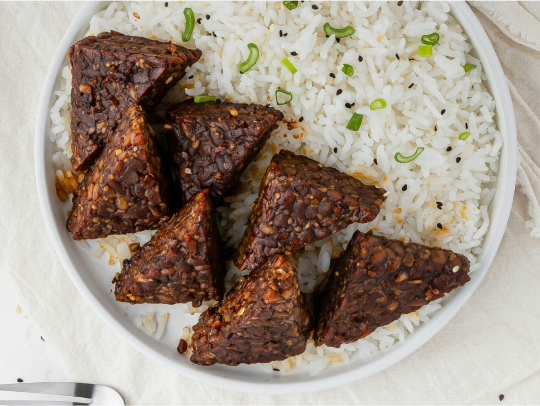
Tempeh is made out of fermented soybeans. It contains probiotic bacteria like Lactobacillus, which can
help inhibit the growth of bad and harmful bacteria in your gut. Tempeh is also an excellent source of
fiber and protein.
13. Sauerkraut
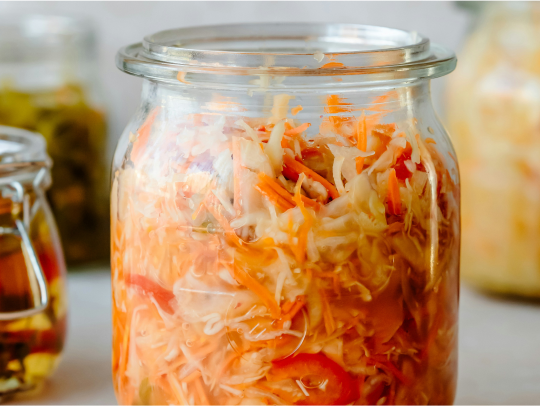
Sauerkraut is made from cabbage that is shredded and then fermented using lactic acid. The
fermentation process is what gives it probiotics, including multiple good bacteria strains to help
protect your gut.
14. Miso

Miso, which is typically consumed as miso soup, comes from salt and
koji-fermented soybeans. Thanks to the fermentation process, miso contains good bacteria that can help
reduce digestive issues and keep your gut happy.
15. Kimchi
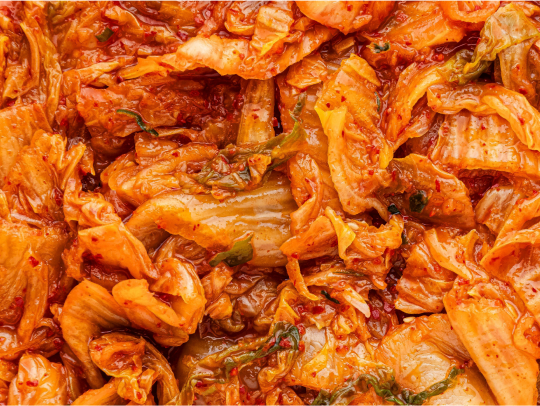
Kimchi is another type of fermented cabbage that also contains a healthy amount of fiber and
probiotics. It is a versatile food that can be eaten as a side dish, added to a sauce, included in
fried rice, and more.
Other Beneficial Foods for Digestive System Support
Many other foods offer benefits and support to your digestive system, whether it’s speeding up the
digestive process or soothing an upset stomach. These foods are often widely known as home remedies
for digestion and are also typically gentle on an upset stomach.
16. Ginger

Ginger has long been known as a stomach soother, helping to relieve indigestion by increasing
gastric motility,
making food pass through your digestive tract faster. It’s also used to prevent or relieve nausea and
may prevent heartburn for some.
17. Bone Broth

Bone broth contains gelatin that comes from glycine and glutamine, amino acids found after simmering
the connective tissues and bones of animals. These amino acids may bind to the liquid in your
digestive tract, allowing food to pass with ease.
18. Peppermint
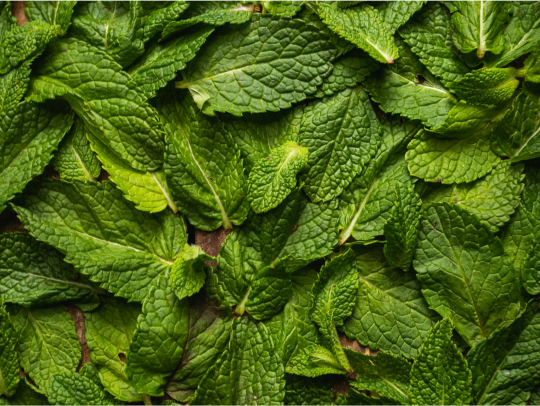
Peppermint isn’t just great in candy — it’s also a fantastic stomach soother, as it helps to relax the
muscles in your digestive tract. Peppermint can help ease IBS symptoms, including bloating and issues
with bowel movements.
19. Banana

Bananas contain plenty of fiber, vitamins, and minerals. They also contain pre- and probiotics, and
may even help reduce acid reflux thanks to being a natural antacid.
Food Combinations for Optimal Digestion
Certain food combinations can help keep your digestive system performing optimally. Fruit or
vegetables by themselves can be fantastic, but you may also consider combinations like the ones below.
Sample Meal Plans for Improved Digestive Health
Healthy meals that can aid your digestion typically have a combination of proteins, grains, fruits,
vegetables, and healthy fat. It’s a good idea to combine grains and proteins with non-starchy
vegetables.
Some ideas include:
- Chicken and asparagus
- Beef with broccoli
- Tofu or tempeh with a vegetable stir-fry
- Chicken and a leafy green salad
- Brown rice and vegetable stir-fry (you may also add a protein source)
- Olive or coconut oil on steamed or roasted vegetables
- Baked or steamed salmon and vegetables
Herbal Remedies and Supplements for Digestive Support

Many supplements and remedies exist to help support your digestion. You may take digestive enzymes to
supplement the amount in your body. You may also try
supplements
like DGL licorice with reflux and reflux-related issues.
Supplements like
Emma Relief
are formulated specifically to rebalance your gut microbiome and keep you healthy.
The Importance of Digestive Health
The complex digestive system is a vital part of the human body, performing functions like breaking
down food and absorbing nutrients into the bloodstream. But why is good gut health a priority?
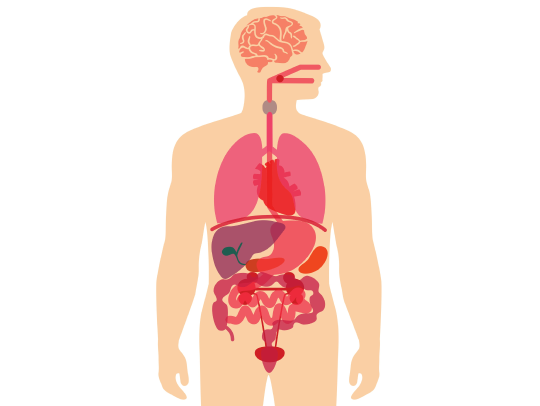
Understanding the Digestive Process
The digestive system starts at the mouth and ends at the anus. As food passes through the tract, it
undergoes three main processes.
First, the food mixes in the digestive system. Then, it begins moving through the tract in a process
called Peristalsis. Finally, the digestive system uses chemicals to break food down into its simplest
forms for the body to absorb.
A healthy digestive system is essential for overall good health, as it allows the body to get the
essential nutrients it needs to promote optimal function and get rid of the toxins and waste in the
body.
Poor digestive health may lead to discomfort in the form of acute symptoms, such as indigestion,
diarrhea, acid reflux, constipation, gas, and bloating.
It may also lead to long-term and life-threatening issues, such as nutrient malabsorption-caused
malnutrition, liver disease, pancreatitis, gastrointestinal bleeding, and cancers relating to the
gastrointestinal tract.
Hydration and Its Impact on Digestion
Water plays many essential roles in our daily lives. It also helps with digestion, helping the body
break down food into nutrients for absorption.
Staying hydrated also helps prevent constipation by keeping stool softer.
It’s a good idea to drink water as much as possible. However, if you’re looking for something
different, aim for healthier options like teas and juices, avoiding added sugar when possible.
Mindful Eating Habits for Better Digestion

Beyond changing your diet, you can also learn mindful eating habits that may improve your digestion.
Consider the below:
-
Eat slowly and chew carefully.
Doing so helps prevent indigestion and other discomfort, as your stomach won’t need to work as
hard to digest your food.
-
Listen to your body.
It takes a few minutes for your body to start sending signals to your brain that it’s had enough
food. Stopping when you feel satisfied, not overly full, can help prevent discomfort.
-
Pay attention to your food.
This allows you to savor the experience and take note of food that may trigger digestive
discomfort.
-
Eat smaller meals more frequently.
Smaller meals are easier for your body to digest, helping manage appetite and stabilize sugar
levels.
Experiencing these symptoms could indicate serious gastrointestinal issues such as pancreatic
insufficiency, peptic ulcers, or celiac disease. Bloating can also stem from fluid accumulation in the
abdomen (ascites), associated with liver disease and kidney failure. It can also be an early indicator
of cancer.
Small Changes for Consistent Habits
When it comes to your digestive health, consistency is key. Making small, progressive changes is ideal
as it can help build long-term habits that can improve your overall health, too. Remember to make
gradual changes by removing and adding food items and groups one at a time!
Looking for a natural way to improve digestion?
Try Emma Relief.
It targets the root causes of discomfort with plant-based ingredients to help you reduce heartburn and
indigestion, support your gut flora, and achieve perfect poops.



